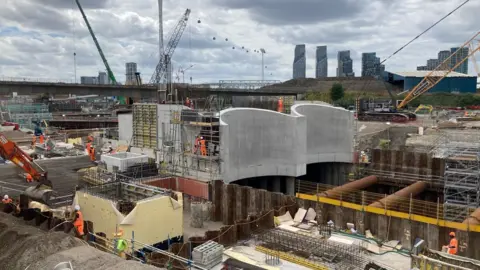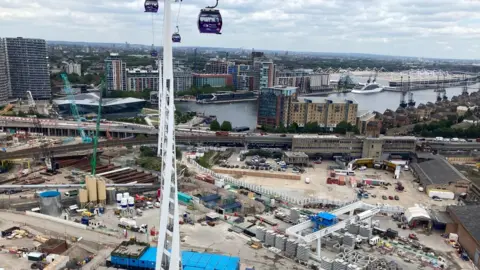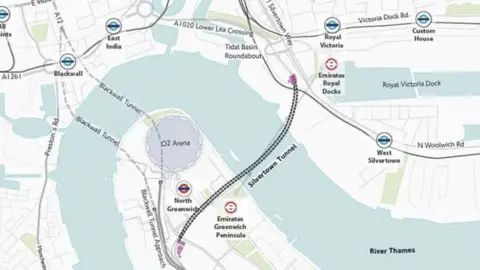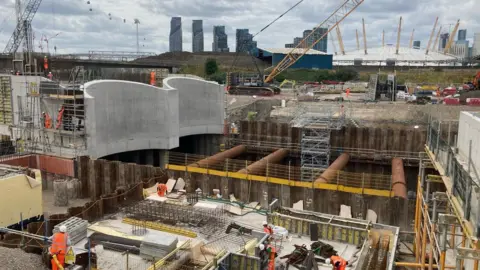Silvertown Tunnel: Cracks in mayoral policies
 Tom Edwards/BBC
Tom Edwards/BBCIt is an infrastructure project that is well-underway with the boring almost completed — but it has a very low profile.
Every step of the Crossrail tunnelling, the media were invited along. Not so with this project.
This is Silvertown Tunnel. It is more than 1km long and will be London's first road tunnel in over 30 years.
Perhaps one of the reasons it isn't being pushed publicity-wise, is it is very controversial.
It is a huge building site close to the O2 and tracks just below the cable car between Greenwich, Tower Hamlets and Newham.
The idea is to relieve the Blackwall Tunnel which suffers from closures and congestion.
To stop more vehicles from using those crossings, the plan is for both to be tolled. HGVs could pay £7.50 a day.
Transport for London (TfL) modelling said there won't be an increase in pollution or congestion if there are tolls.
And the tunnel is "public transport orientated". It will have a bus lane and a bus that can carry bikes.
 Tom Edwards/BBC
Tom Edwards/BBCMayor Sadiq Khan gave the tunnel the go-ahead, funded with a PFI against future earnings.
TfL said the Silvertown scheme will address the queuing and delays at Blackwall Tunnell as well as provide cross-river zero emission buses.
It said it will also reduce pollution caused by the congestion on some of London's most polluted roads.
However, environmentalists said the tunnel will cause many problems.
And campaigners say however you dress it up, a road tunnel is bad for the environment.
Victoria Rance, of Stop Silvertown Tunnel Coalition, said that the tunnel will increase carbon emissions and worsen air quality.
HGVs using bus lanes
Instead of using the Dartford Crossing, larger HGVs will be able to use the tunnel — and its bus lane.
Campaigners said that will mean more HGVs going through Newham and Greenwich.
"It's going to take 25,000 to 30,000 vehicles into Newham," Ms Rance said.
"It's going to attract new HGVs into Greenwich, past our schools and our kids and into Newham — the most polluted borough in the UK. "
Sheila Keeble, of the Greenwich Society, said the tunnel "will be magnet for bigger traffic than we've got at the moment".
 TfL
TfL"One of the issues we have is all the developers are now looking at building distribution centres," she said.
"At the moment the Blackwall Tunnel protects us from bigger traffic... Silvertown won't."
Patrick Ives, of the East Greenwich Residents Association called the project "ill-considered".
"Adding more traffic capacity isn't the way to solve London's issues.
"I don't know quite what the mayor is thinking but you're just building in mayhem certainly on this side of the river and probably the other."
 Tom Edwards/BBC
Tom Edwards/BBCBoth Labour councils Newham and Greenwich want the tunnel to be repurposed as a public transport tunnel.
All of which leaves Mr Khan with another environmental policy problem.
We have already seen fractures appear in his flagship ULEZ expansion with opposition from within his own party.
Now there is opposition to his Silvertown road tunnel.
Timi Jibogu, Greenwich member of Youth Parliament, said: "[Sadiq Khan] is doing ULEZ to decrease pollution while doing the tunnel to increase [it].
"It's very hypocritical of him and it's really going to hurt young people in the area."
David Rowe, TfL's director of investment delivery planning, said that they considered various options including a walking and cycle crossing or public transport only.
"None of those options performed anywhere near as well as putting in place the new Silvertown crossing with user-charging and new cross river bus services," he said.
"That was the combination which ensured we could do it with a reduction in congestion, resolve the current issues of extensive queuing, ensure better reliability for people who need to cross the river and lead to an overall improvement in air quality."

Follow BBC London on Facebook, Twitter and Instagram. Send your story ideas to hellobbclondon@bbc.co.uk
